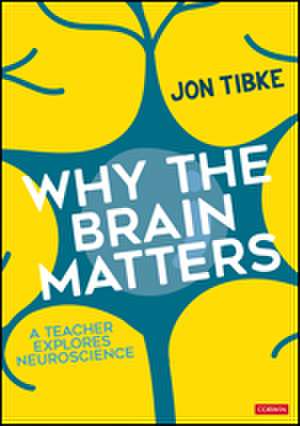Why The Brain Matters: A Teacher Explores Neuroscience
Autor Jon Tibkeen Limba Engleză Paperback – 26 feb 2019
| Toate formatele și edițiile | Preț | Express |
|---|---|---|
| Paperback (1) | 233.84 lei 3-5 săpt. | +15.55 lei 10-14 zile |
| SAGE Publications – 26 feb 2019 | 233.84 lei 3-5 săpt. | +15.55 lei 10-14 zile |
| Hardback (1) | 651.65 lei 6-8 săpt. | |
| SAGE Publications – 26 feb 2019 | 651.65 lei 6-8 săpt. |
Preț: 233.84 lei
Nou
44.78€ • 46.14$ • 37.52£
Carte disponibilă
Livrare economică 01-15 februarie
Livrare express 21-25 ianuarie pentru 25.54 lei
Specificații
ISBN-10: 1473992915
Pagini: 216
Dimensiuni: 170 x 242 x 18 mm
Greutate: 0.35 kg
Ediția:First Edition
Editura: SAGE Publications
Colecția Corwin UK
Locul publicării:London, United Kingdom
Recenzii
'At a time when teachers are being encouraged to seek simple answers from out-of-date cognitive psychology, or encouraged to jump on the latest bandwagon by an ever-growing number of snake-oil salespeople, it is deeply refreshing to read a book that takes a critical but positive stance on the relationship between neuroscience and education. Jon Tibke’s book offers just such a well-informed and accessibly-written account of what we know, what we don’t know, and what it all means for teachers.
From imaging to neuroplasticity to smart drugs to memory to genetics, Jon Tibke offers concise discussions of key issues in neuroscience that are relevant – and of interest – to teachers as well as debunking pervasive neuro-myths. The glossaries at the end of each chapter are themselves extremely useful.
The book also make a great contribution to teachers’ research literacy and would make a valuable contribution to professional development libraries.'
This is a really well-balanced book that will help you to understand the brain and the neuroscienti?c ?eld so that you can think critically about it and why it should figure in your professional updates, discussion and development. You can also use it to understand and employ some relevant study skills in ?nding reliable sources, think critically about research and look for corroboration from related studies, all skills which enhance your own professional development. I highly recommend it.
Why the Brain Matters is an outstanding book from a skilled communicator and an experienced and enthusiastic educator. I recommend it as an accessible entry point for everyone who has an interest in neuroscience, especially secondary school teachers. It isn’t condescending in its reductionism and it is illuminating in its synthesising of ideas into a context. And where it needs to be it is provocative. In short, it is exactly what a mainstream book on neuroscience ought to be.
Cuprins
Chapter 2: What should you know about the brain?
Chapter 3: What your pupils should know about their brains
Chapter 4: The neuromyths
Chapter 5: How to keep up with reliable and accurate information
Chapter 6: The brain and the pre-school, primary and secondary school years
Chapter 7: How can schools become involved in and influence research?
Chapter 8: Famous brains in education: Temple Grandin and Barbara Arrowsmith-Young
Chapter 9: Skills, learning needs and the brain
Chapter 10: What lies ahead?
Notă biografică
Jon Tibke began his teaching career in Lancashire in 1982, where he taught in four secondary schools over a period of 25 years. Following six years as a deputy headteacher, he moved into initial teacher training, undertaking PGCE roles with the Open University, Edge Hill University and the University of Cumbria. In 2014, Jon became a freelance teacher educator, leading events for trainee, newly qualified and experienced teachers throughout England and Wales, as well as further afield in India, Kazakhstan, Nepal and Qatar. Having finished writing The Brain and Teaching: a cautious guide, Jon is concentrating on the completion of his PhD thesis, The Case of Teachers and Neuroscience: how do teachers mediate information about the brain?
